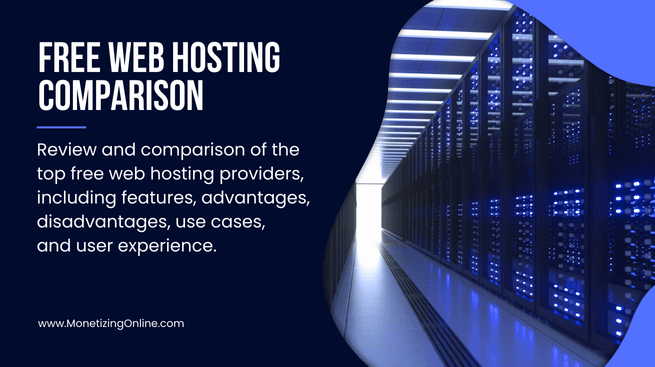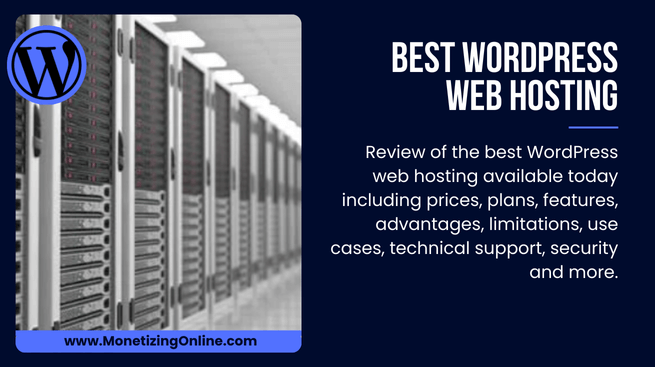Free Unlimited Hosting: Full Breakdown Of The Best Free Hosts

Free unlimited hosting sounds like a dream come true, launch your website without paying a dime and enjoy limitless facilities.
But is it really that simple?
When it comes to free hosting providers that claim to offer unlimited services, you have to be careful.
The words “free” and “unlimited” are a marketing spin.
In practice, unlimited bandwidth or storage are subject to heavy restrictions hidden in the fine print, like fair use policies, daily limits, CPU throttling, and other performance trade-offs you should know about before signing up.
If you use too many server resources, your website can get suspended without warning.
In this guide, we’ll break down the free hosts with unlimited features, what you actually get, what to watch out for, how to choose the right platform for your site.
Whether you’re starting a blog or a small business website, understanding the limits of the free unlimited hosting will save you time, frustration, and even money down the line.
Disclaimer: This article contains affiliate links. If you sign up for a paid plan through my links, I may receive small compensation at no cost to you. You can read my affiliate disclosure by going to my privacy policy. This blog is for informational purposes only and does not constitute financial advice.
Free Unlimited Hosting Providers
Here is my list of free web hosts that advertise some form of “unlimited” hosting features:
1. InfinityFree
2. ProFreeHost
3. FreeHosting
4. AeonFree
5. CpanelFree
Conclusion
Frequently Asked Questions
Recommended Articles
Now, let’s dive deeper into what these free hosting companies offer, and explore their features, user experience, advantages, disadvantages, use cases, and alternative premium web hosting services.
1. InfinityFree
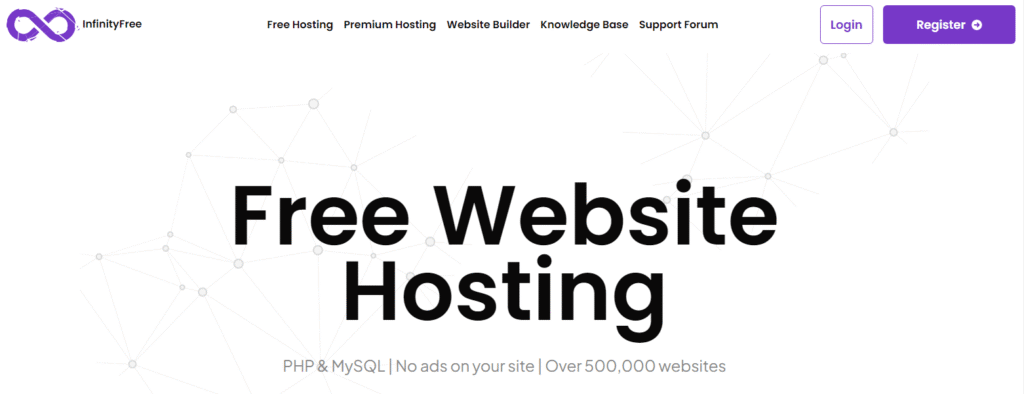
Overview
InfinityFree is a popular free web hosting provider that offers unlimited bandwidth, making it a potential option for those seeking a zero-cost way to host websites.
Launched in 2012, the platform has gained reputation in the free hosting space for offering more generous limits than most competitors, with no forced ads and support for custom domains.
While InfinityFree markets itself as “unlimited,” it does enforce certain fair usage policies, like file uploads are capped at 10MB per file, and accounts are limited to 50,000 total files (inodes).
Despite these restrictions, it remains one of the few free hosts that doesn’t explicitly cap bandwidth or daily visits, which gives users more flexibility compared to hosts with hard limits.
Basic Features
Here are the features that you get with free unlimited hosting provided by InfinityFree.
- 5GB disk space.
- One-click installer via Softaculous.
- Free sub-domains.
- Supports custom domain connection.
- Community forum.
User Experience
Signing up is quick and doesn’t require a credit card.
You can launch a site using a free sub-domain or connect a custom domain.
The setup is beginner-friendly, though the interface isn’t as polished as premium hosts.
Still, everything you need, like DNS settings, domain pointing, and file management, is there.
InfinityFree uses its own version of cPanel called VistaPanel, which feels dated but it’s functional.
For a free host, performance is relatively stable.
Websites load reasonably fast for static or low-traffic sites, and the unlimited bandwidth claim holds up under normal use.
With that being said, while it advertises 99.9% uptime, there’s no official uptime guarantee, so slowdowns or outages may often occur, especially during peak usage.
Advantages
InifnityFree’s advantages as a free web hosting provider include:
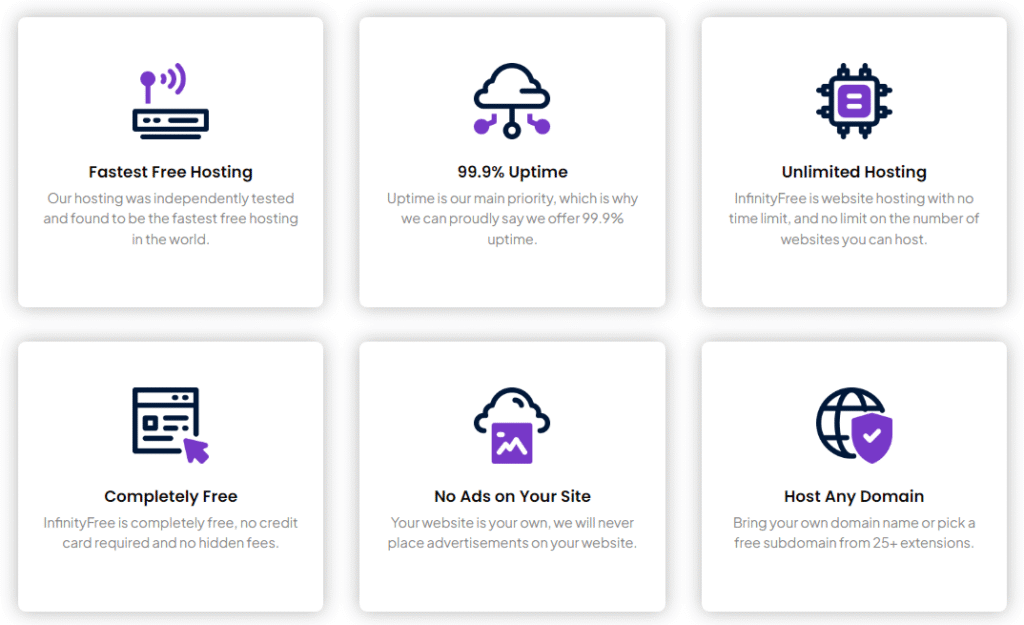
- Unlimited bandwidth.
- Free SSL certificates.
- No forced ads.
Disadvantages
Despite been free, or because of it, InfinityFree has several disadvantages as a free unlimited hosting service:
- You’re limited to using sub-domains as there is no free domain.
- Slow loading times, because resources are divided among many users.
- No email hosting.
- “Unlimited” bandwidth has fair usage policy, so if your website exceeds certain resource levels it’ll be suspended.
- Inconsistent uptime.
- No malware scanning.
- Daily hit limits (around 50,000/day).
- Resource usage caps on CPU, RAM, and MySQL.
- No cPanel.
- Adverts on some premium features.
- Doesn’t support scheduled backups.
- No customer support beyond forums.
Is Right For Me?
For a service that costs nothing, InfinityFree offers good starting point for developers or beginners who want to test ideas without financial commitment.
However, if you’re seeking high-performance, technical support, robust security and more resources, it’s worth considering alternatives like Bluehost.
2. ProFreeHost
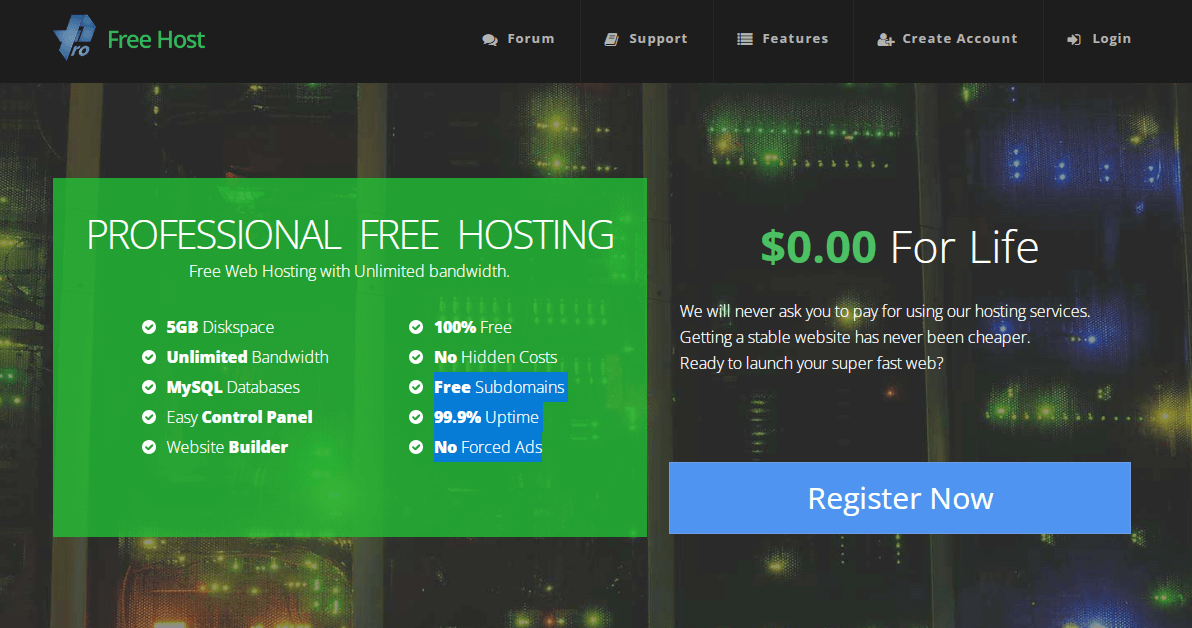
Overview
ProFreeHost markets itself as a hosting provider offering unlimited bandwidth at no cost.
The platform is aimed at beginners, hobbyists, and developers looking for a free way to get websites online without paying upfront or being forced to run ads.
While it advertises free unlimited hosting, like most free hosts, there are soft limits and fair use policies in place, such as a cap on file count (inodes) and restrictions on individual file sizes.
Overall, ProFreeHost is a straightforward and zero-cost option for launching small sites or learning web development, as long as users understand the hidden boundaries behind its “unlimited” label.
Basic Features
ProFreeHost offers basic web hosting functionality and features.
- 5GB disc space.
- Website builder.
- Free Sub-domains.
- No Adverts.
- 1-click installer.
User Experience
As a free hosting provider, ProFreeHost is generally functional but minimalist.
It’s best suited for users who are comfortable with a bit of manual setup and self-service troubleshooting.
The registration process is straightforward, but the website and interface feel slightly outdated compared to premium hosting platforms.
Once set up, managing your website is relatively easy if you’re familiar with traditional hosting environments.
It offers cPanel with essential tools like file management, domain settings, MySQL databases, and FTP access.
ProFreeHost delivers acceptable speed for simple, lightweight websites with static pages or small PHP projects.
However, like most free hosts, performance can be inconsistent.
There’s no uptime guarantee, and users frequently report downtimes or slow server response under load.
Advantages
ProFreeHost’s free unlimited hosting can be suitable for non-critical projects or for learning web hosting fundamentals.
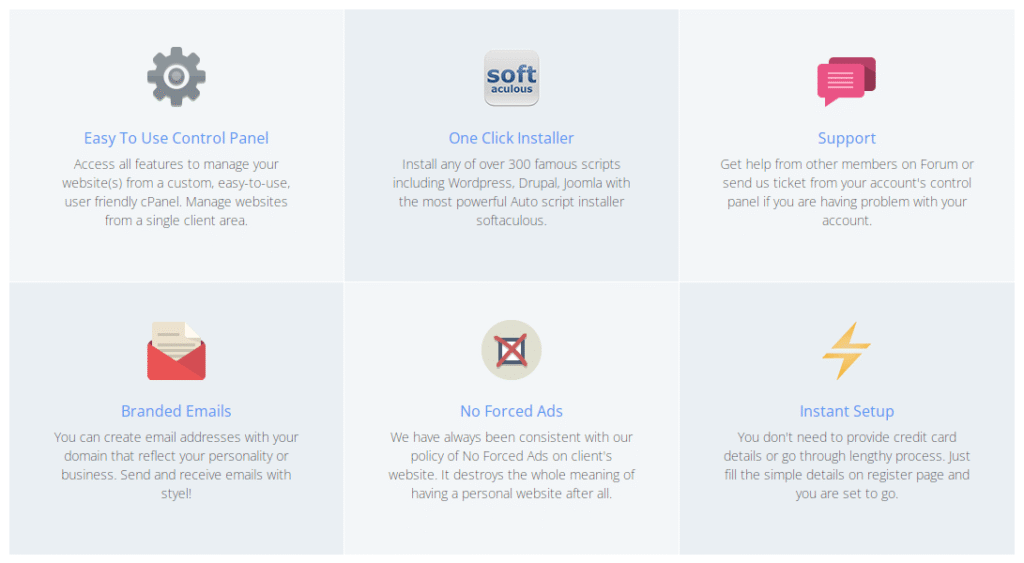
- Unlimited bandwidth.
- Email account.
- cPanel.
Disadvantages
ProFreeHost is an option to consider for basic website needs but comes with notable trade-offs and disadvantages.
- Support is limited to community forums, which makes troubleshooting difficult for beginners or users facing technical issues.
- Performance can vary, especially during peak times, so don’t expect blazing speed or guaranteed uptime.
- Despite being “unlimited,” there are fair usage limits, push those too far, and your site may get suspended without warning.
- No free SSL certificate.
- Lack of backup support.
- There are no security features.
- You don’t get a free custom domain.
- File upload limits, individual file uploads are capped at 10MB, which restricts media-rich content.
- If your site remains inactive for an extended period (no traffic or updates), it may be automatically suspended or deleted without notice.
Is Right For Me?
While ProFreeHost’s uptime and performance are good for personal or testing projects, it’s not ideal for blogs, business or high-traffic websites.
If you’re building a professional site and you need advances features, high performance, and 24/7 support, you’re better off signing up for Bluehost.
3. FreeHosting
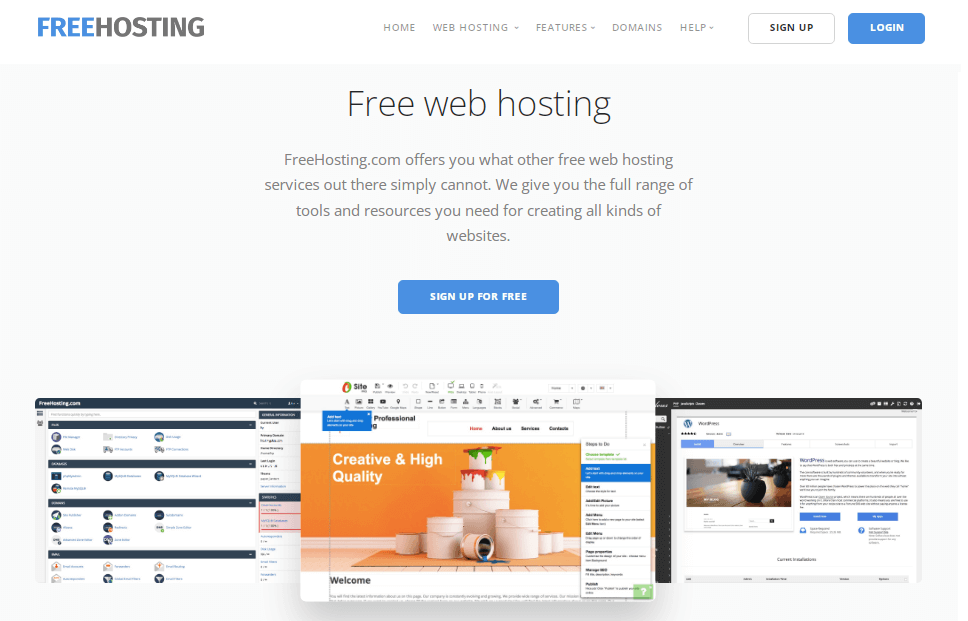
Overview
FreeHosting is positioned as a free unlimited hosting solution for anyone seeking to host personal websites, test projects, or small-scale online applications.
It aims to fill a similar niche to any other free hosting provider, offering no-frills, ad-free hosting without upfront payments or forced branding on user websites.
However, being a free host, it comes with the usual caveats: limited support options, outdated interface, manual setups, and performance that may vary under load.
While FreeHosting isn’t as polished or supported as paid alternatives, it offers developers, hobbyists, or users learning how to build websites a platform that costs nothing.
Just keep in mind that its long-term reliability and active maintenance are difficult to verify due to limited public transparency, so only use it for non-critical projects or experimentation.
Basic Features
As part of its free hosting plan, FreeHosting offers basic features that include:
- Hosts 1 site.
- 10GB web space.
- cPanel access.
- 1 email.
- 1 MySQL database.
User Experience
The on-boarding process is straightforward; you choose a sub-domain or link your own custom domain, set up login credentials, and get access to the cPanel control panel within minutes.
For beginners, the control panel is simple enough to navigate.
Managing your files is easy with FTP access or the built-in web-based file manager.
However, PHP and MySQL run smoothly for basic websites, large or complex applications will hit invisible limits.
Load times are moderate and uptime is generally stable, for a free unlimited hosting, though not guaranteed.
One of the weakest areas is customer support.
It’s none existent.
There’s no official customer service, live chat, or ticketing system.
You have to rely on self-help or forums.
Advantages
The main advantages that FreeHosting offers are:
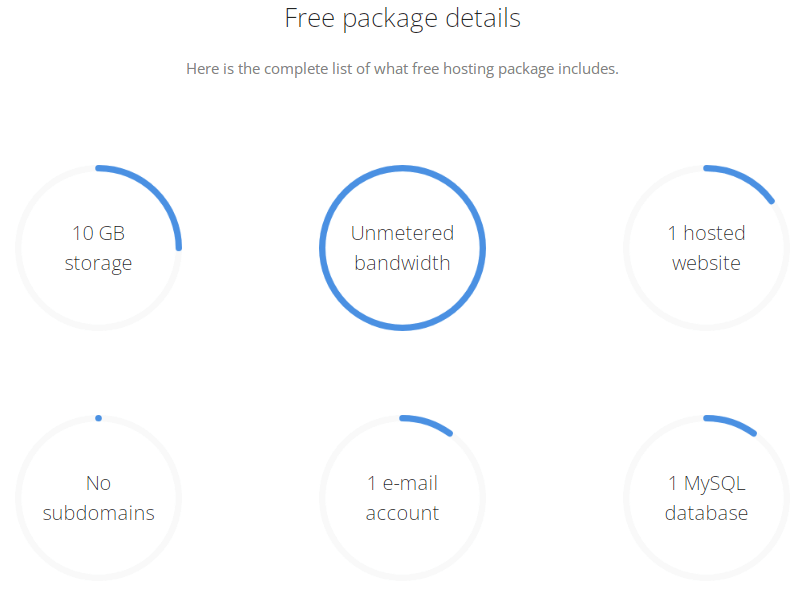
- Unmetered bandwidth.
- Build-in website builder.
- Auto app installer.
Disadvantages
FreeHosting also comes with its share of drawbacks.
- You can’t install SSL unless you pay $29.95 for it.
- Limited customer support with slow response times.
- Lack of website backups.
- One website per account.
- No sub-domain support.
- Heavy up-selling.
- Doesn’t include free domain registration.
- Rigid terms of service restrictions.
- No server configuration changes allowed.
- Users from Brazil, Cuba, Iran, Sudan, Syria, and Vietnam can’t sign up.
- Lack of security features.
Is Right For Me?
As a free unlimited hosting provider, FreeHosting is a mixed bag, offering some flexibility for a $0 service, but also carrying the expected limitations and rough edges that come with free-tier hosting.
If you are serious about your project, you’d rather get a reliable and supported hosting platform like Bluehost for just $2.95/month from the get go.
4. AeonFree
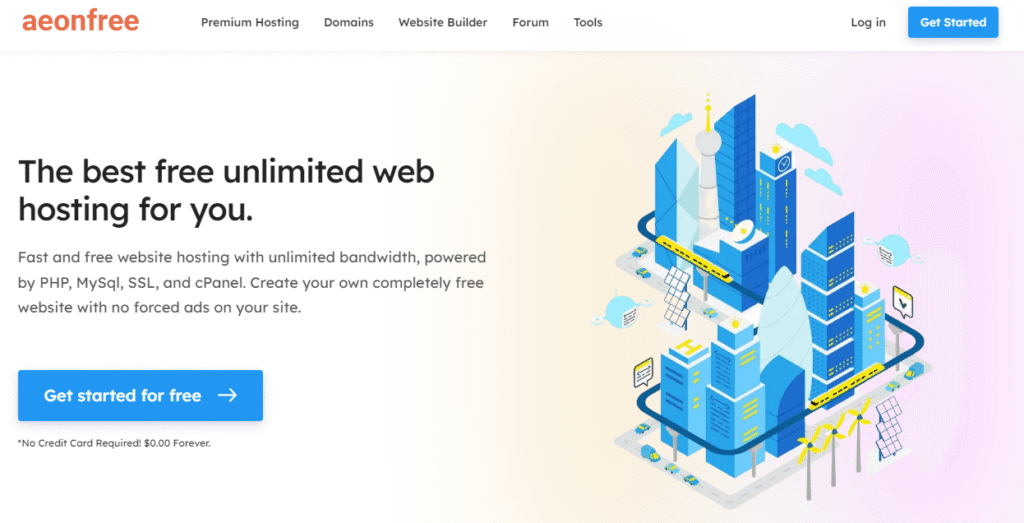
Overview
AeonFree was launched with the goal of giving beginner webmasters, students, and developers a free entry point into web hosting without the pressure of forced upgrades or intrusive ads.
It quietly entered the market as a free unlimited hosting provider, around the mid-to-late 2010s, gaining attention in online forums and among users looking for an alternative to the more ad-heavy or restrictive free hosts.
Despite limited branding and visibility, AeonFree carved a niche among users who prefer simplicity over features.
Its minimalist website and no-frills onboarding process reflect its focus: provide instant access to web space without up-sells or distractions.
Basic Features
Don’t expect all the bells and whistles, but AeonFree covers the essentials you need to host a basic site.
- 1 FTP account.
- 400 MySQL databases.
- 5 GB disk space.
- Supports full .htaccess
- Free DNS service.
User Experience
AeonFree’s offers minimalistic hosting for users who are comfortable working without hand-holding.
It offers the core essentials to get a website online, without ads or upfront costs, but lacks the polish, automation, and support you’d find in premium hosting services.
The interface is a bit outdated, yet simple to use.
It has a stripped-down control panel, which covers the basics – domain management, FTP setup, MySQL databases, and file uploads.
For low-traffic or static websites, performance is acceptable.
You can install SSL certificates manually, allowing HTTPS support.
But you need to handle your own backups, as the free unlimited hosting service doesn’t offer automatic backup or restore options.
Account inactivity over time may lead to suspension, though this isn’t always clearly communicated.
Advantages
AeonFree keeps things simple but gives you just enough tools to get a basic website up and running.
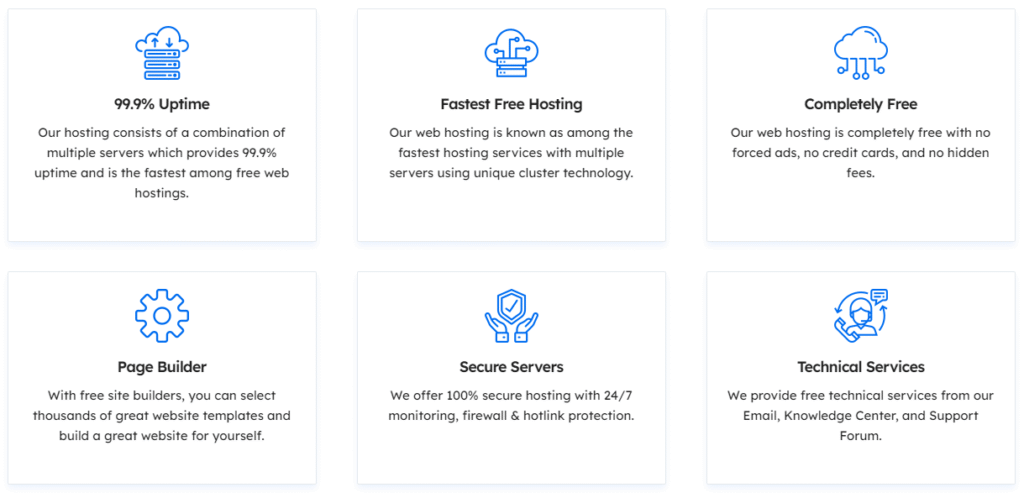
- Unlimited bandwidth.
- Free SSL certificate.
- Free Cloudflare CDN.
Disadvantages
Before you commit your next project to AeonFree, here are some of the catches to keep in mind.
- No live chat, ticket-based support, or even a detailed knowledge base, so you’re flying solo when issues arise.
- Outdated control panel, which lacks the sleek design, intuitive layout, and advanced features many users expect.
- Fair usage policies for the “unlimited” features, which aren’t clearly defined, leading to unpredictability.
- If you don’t log in for a certain period (usually 30–60 days), your account could be suspended or deleted due to inactivity.
- Lack of automatic backups or recovery tools, so if something breaks or gets deleted, restoring your site is entirely your responsibility.
- Beyond basic PHP and MySQL, there’s no support for Node.js, Python, or more advanced frameworks.
- There are no full-featured email inboxes.
- It doesn’t offer a free domain.
- The SSL has to be manually installed.
Is Right For Me?
AeonFree’s free unlimited hosting service can be a useful sandbox for web experiments, learning PHP, MySQL or hosting lightweight personal sites with minimal traffic.
But if you need high performance, 24/7 support, and advances features, because you’re building a professional site, then you need a robust hosting solution like Bluehost.
5. CpanelFree

Overview
CpanelFree is an intriguing option in the free web hosting space.
The name is a play on the widely recognized and user-friendly cPanel control panel, however their free hosting doesn’t come with a cPanel, which is disappointing.
The service promises unlimited bandwidth with fair use policies in place, along with support for custom domains, PHP, MySQL databases, and more.
While it doesn’t come from a big-name provider and isn’t heavily advertised, CpanelFree caters to students and hobbyists looking to host small websites or learn about web hosting.
However, it’s important to note that because cPanelFree isn’t backed by a major hosting company, it may lack the reliability and technical support that you’ll find in larger hosting companies.
Basic Features
Though limited in some areas, cPanelFree provides basic features needed to build and manage a small website.
- 5GB web space.
- Free SSL certificate.
- 1 FTP accounts.
- Allows unlimited domains (if you buy your own).
- Free sub-domain.
User Experience
CpanelFree is a free unlimited hosting platform that offers a starting point for those new to web hosting or those with minimal needs.
However, performance can be inconsistent.
While the service boasts unlimited bandwidth and 5GB of disk space per domain, the free hosting plan doesn’t guarantee good server speeds or reliability.
Users often report slow loading times and downtime when traffic spikes or during server maintenance.
This is a deal breaker for anyone planning to run a site that requires consistent uptime.
The lack of customer support is another downside.
Since it’s a free service, you have to rely on self-help guides or forums for troubleshooting.
This is fine for those who are comfortable with DIY solutions, but it’ll be frustrating for those looking for more hands-on assistance.
Advantages
Below I’ve listed the advantages that CpanelFree offers:
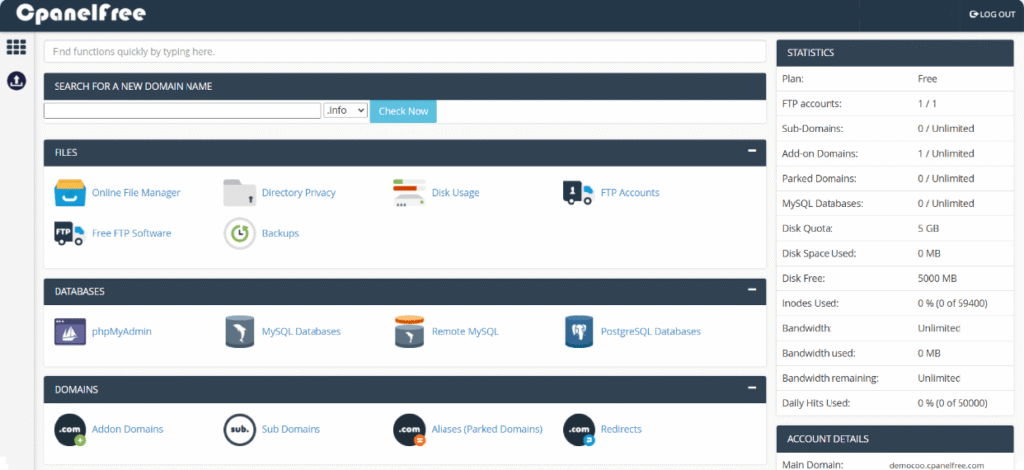
- Unlimited bandwidth.
- Softaculous auto installer.
- Unlimited database.
Disadvantages
While cPanelFree offers a free hosting solution, there are several drawbacks to consider before choosing it for your website.
- Inconsistent performance, users often experience slow load times and occasional downtime, which can affect site reliability.
- No customer support to help with technical issues.
- It doesn’t offer an email account.
- There’s no uptime guarantee, so your site could be taken offline during server maintenance or technical issues without notice.
- Only 5GB of disk space per domain, which may be insufficient for larger websites or those expecting growth.
- Limited customization.
- Restricted flexibility for users with more complex needs.
- No cPanel control panel.
- Basic security features.
Is Right For Me?
CpanelFree is a free unlimited hosting option for personal projects, test websites, or development environments but it’s definitely not suitable for high-traffic or business websites.
If you’re starting a full-scale blog or business website that needs more power, control, and reliability, you’d rather start with an affordable alternative like Bluehost for only $2.95/month.
Free Unlimited Hosting: Conclusion
In conclusion, free unlimited web hosting can be an appealing option for individuals or businesses looking to launch a website without upfront costs.
Providers like InfinityFree and ProFreeHost offer basic features that allow you to build and manage your websites without financial commitment.
While these platforms provide essential tools like unlimited bandwidth, they always come with serious drawbacks such as inconsistent performance, no customer support, and restricted features.
For casual users or those just starting out, these free options can serve as a stepping stone to understanding web hosting and building a basic online presence.
However, for those seeking reliability, advanced features, and better performance, it’s worth going for a robust and reliable hosting from providers like Bluehost.
Ultimately, choosing a free hosting provider depends on your website’s needs, traffic expectations, and willingness to accept the drawbacks coming with it.
If you’re just testing the waters or working on a low-traffic site, free unlimited hosting could be a fit, but always weigh the pros and cons before committing long-term.
Disclaimer: This article contains affiliate links. If you sign up for a paid plan through my links, I may receive small compensation at no cost to you. You can read my affiliate disclosure by going to my privacy policy. This blog is for informational purposes only and does not constitute financial advice.
Free Unlimited Hosting: FAQs
Here I give answers to some of the most common questions about free unlimited web hosting.
Q: Does free hosting exist?
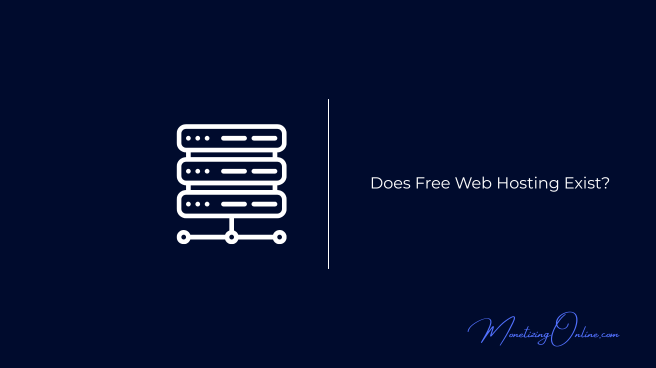
A: Yes, free hosting does exist, but it typically comes with limitations and trade-offs compared to paid web hosting services.
Many providers offer free hosting plans to attract new users or for individuals who have basic website needs.
Here’s a breakdown of what free hosting typically offers and its limitations:
No Initial Cost:
- As the name suggests, free hosting doesn’t require any payment upfront, making it an attractive option for those just starting out or testing the waters with a website.
Basic Features:
- Free hosting often provides limited disk space, usually a few GB, and bandwidth, meaning your website can’t handle very high traffic or store large amounts of data.
- Website Builder or CMS Support: Many free hosts offer website builders or content management system (CMS) options like WordPress, making it easy to get started.
Sub-domain Option:
- Most free hosting plans include a subdomain e.g., freehost.com, which is fine for personal or hobby websites but may not be professional for business purposes.
Limited Email or No Email:
- Free unlimited hosting plans might provide a limited number of email accounts or none at all.
Free hosting exists and can be a viable option for small, personal websites or testing.
However, for any website that requires reliability, scalability, or advanced features, it’s often better to invest in a paid hosting service.
Q: Is free hosting really free?
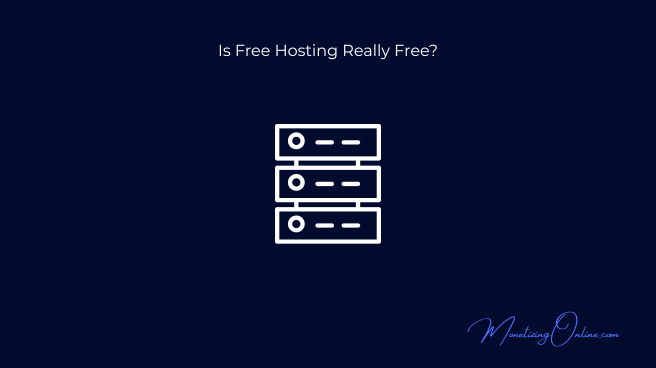
A: Free hosting isn’t truly “free” in the sense that there are usually trade-offs involved.
While you don’t have to pay money upfront, there are a few key factors to consider:
- Limited resources: free hosting plans often come with restrictions on bandwidth, storage, and processing power, which can severely limit your site’s performance and scalability.
- Ads on your site: many free hosting providers place ads on your website to generate revenue, these ads can be intrusive and unprofessional, which may harm your site’s user experience.
- Basic support (or none at all): free unlimited hosting typically offers little to no customer support, if you encounter issues, you’ll either need to rely on self-help resources or figure things out on your own.
- Hidden costs: some providers offer a “free” plan that’s very limited, and may encourage users to upgrade to paid plans for better features or performance, essentially forcing you to pay if your website grows.
- Less control: free hosting plans limit your ability to fully customize your website, install advanced features, or use certain tools.
- Security concerns: free hosts don’t offer robust security features, making your website more vulnerable to attacks.
- Data Privacy Concerns: you’re also more susceptible to having your data and website content mishandled.
In essence, while the hosting itself may be free, you’re usually giving up features, performance, and control that come with paid plans.
For personal projects, testing or learning, free hosting can be an option, but for serious websites, it’s often worth considering a paid hosting solution to avoid these limitations.
Q: What does unlimited hosting mean?
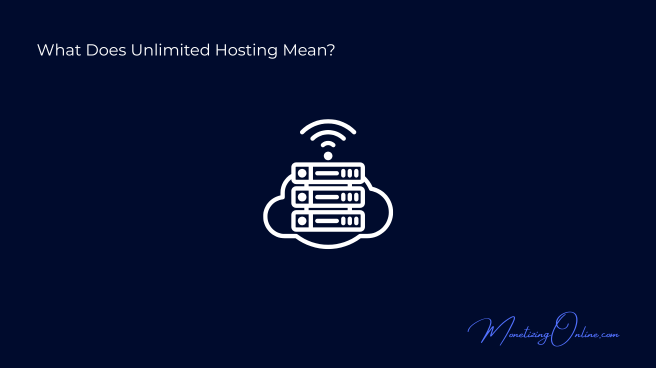
A: Unlimited hosting refers to a hosting plan where the provider advertises that you have no set limits on certain resources, such as bandwidth, disk space, or the number of websites you can host.
However, it’s important to understand that free unlimited hosting usually comes with some restrictions or terms that are not immediately clear.
Here’s a breakdown:
Bandwidth:
In theory, “unlimited bandwidth” means that you can have as much data transfer i.e., visitors accessing your website and downloading its content as needed.
In practice, however, there’s often a fair usage policy in place.
This means if your website receives an extremely high amount of traffic or consumes excessive resources; the host may throttle your speed, limit your access, or even suspend your site temporarily.
Disk Space:
“Unlimited disk space” sounds like you can store an unlimited amount of data on the server.
However, hosting providers generally have restrictions on file types e.g., they may not allow you to store large video files or use the server for data backups.
You may also be limited by the number of files (inodes) or the server’s performance rather than actual storage capacity.
Email Accounts / Websites:
Some “unlimited” plans allow you to create as many email accounts or websites as you want, but again, there are often hidden limitations such as resource allocation, server speed, or usage policies.
Fair Usage Policy:
Hosting providers that offer free unlimited hosting services typically include a fair usage policy to prevent abuse.
For example, if your website’s traffic spikes suddenly, it might be temporarily throttled or suspended to prevent it from affecting other users on shared hosting servers.
Performance & Support Limitations:
Even with “unlimited” resources, performance like website speed or uptime might be compromised, and customer support can be non-existent with free or hosting services.
In short, “unlimited” hosting generally refers to very high or practically unrestricted amounts of certain resources.
However, there’s always a catch, and it’s important to read the terms of service carefully to understand the actual limitations that apply.
Q: What is the traffic limit on InfinityFree?
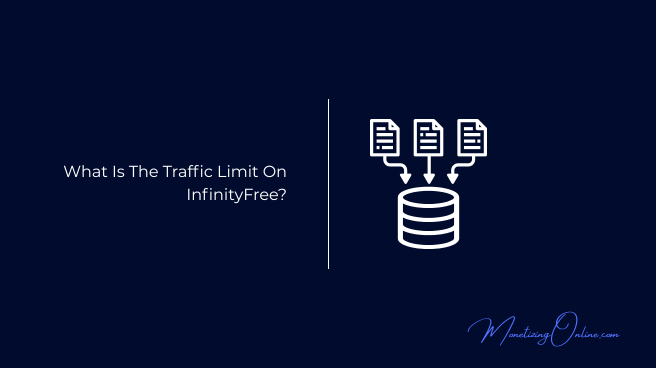
A: InfinityFree’s free hosting plan imposes a daily hit limit of 50,000.
A “hit” refers to each individual request made to your website, including loading HTML pages, images, CSS files, JavaScript files, and other resources.
For example, if a single page on your site contains 10 images, 2 CSS files, and 3 JavaScript files, a single visit to that page could generate 15 hits.
Therefore, it’s possible to reach the daily limit with just a few hundred visitors, depending on the content and structure of your site.
If your website exceeds this 50,000-hit threshold in a 24-hour period, InfinityFree will temporarily suspend your account for 24 hours to prevent server overloads.
After this period, your account will be automatically reactivated.
To manage and reduce your hit usage, consider optimizing your website by minimizing the number of files loaded per page, leveraging browser caching, and using external hosting for large files when possible.
Additionally, implementing a content delivery network (CDN) like Cloudflare can help distribute traffic and reduce the number of hits to your InfinityFree account.
Q: How big is InfinityFree storage?
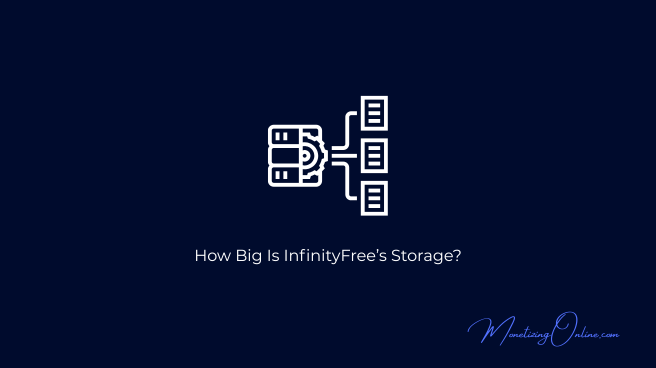
A: InfinityFree’s free unlimited hosting plan provides 5 GB of disk space for your website files.
This includes all the files you upload, such as HTML, CSS, images, scripts, and any plug-ins or themes you install.
However, database contents (like MySQL data) are stored separately and do not count against this 5 GB limit.
It’s important to note that while the disk space is capped at 5 GB, there are additional limitations to consider:
- File size limit: each individual file cannot exceed 10 MB in size.
- Inode limit: you can have up to 30,000 files and directories in your account.
These constraints are designed to ensure fair usage and maintain server performance across all users.
If your website exceeds these limits, you may encounter issues such as being unable to upload new files or experiencing slower performance.
Free Unlimited Hosting: Recommended Articles
Looking to dive deeper into web hosting and related topics?
Check out our recommended articles on MonetizingOnline.com for more insights and tips:



